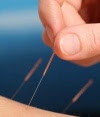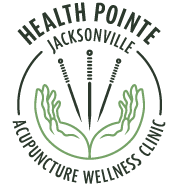Acupuncture for Integrative Oncology Support

The American Cancer Society has reported that half of all men and a third of all women in the United States will develop cancer during their lifetimes. Although there are many forms of cancer, all forms of the disease begin
with abnormal cells that grow out of control.
Unlike other illnesses that are eradicated by the body’s natural defense system, cancer needs to be treated with
powerful medical interventions. Unfortunately, most of the current cancer treatments available have some
debilitating side effects.
Acupuncture and Oriental Medicine have received much attention as an adjunctive therapy in cancer treatments
because they address many of the unpleasant symptoms and side effects that come up during and after chemo-
therapy, radiation, biological therapy and surgery.
If you are currently undergoing treatment for cancer, acupuncture and Oriental medicine can provide real help,
by decreasing many of the side effects associated with conventional cancer treatments.
Some of the issues acupuncture can help with include:
- Night Sweats and Hot Flashes
Acupuncture takes a holistic approach to health care and is particularly useful in providing pain relief, reducing
the impact of side effects, accelerating recovery and improving overall quality of life.
According to the National Cancer Institute, acupuncture may cause physical responses in nerve cells, the pituitary
gland, and parts of the brain. It is proposed that, by stimulating physical responses in these areas, acupuncture
positively affects blood pressure and body temperature, boosts immune system activity, and causes the body’s
natural painkillers, such as endorphins, to be released.
To learn more about how acupuncture can safely and effectively be incorporated into an oncology treatment
plan call (904) 448-0046 for a consultation today!
Science Provides Proof of Acupuncture’s Helpful Role in Cancer Therapy
Clinical trials have examined the effects of acupuncture on cancer as a disease, as well as the symptoms
caused by cancer treatments. Results have shown that, for many patients, treatment with acupuncture relieves
symptoms or keeps them from getting worse.
Relief for Nausea and Vomiting:
The strongest evidence of the beneficial effect of acupuncture has come from clinical trials that investigated its
use for relieving nausea and vomiting. Several types of clinical trials using different acupuncture methods
showed acupuncture reduced nausea and vomiting caused by chemotherapy and surgery.
Boosts the Immune System:
Human studies on the effect of acupuncture on the immune system of cancer patients showed that it improved
immune system response, including an increase in the number of white blood cells.
Improves Pain Management:
In clinical studies, acupuncture reduced pain levels for some cancer patients. In one study, most of the
patients treated with acupuncture were able to stop taking drugs for pain relief or to reduce their doses.
Relieves Pain and Stiffness during Hormone Therapy:
In 2010, The Journal of Clinical Oncology published the results of a small study that concluded that
acupuncture helped relieve pain and stiffness in breast cancer patients who were simultaneously being
treated with hormone therapies.
Minimizes Dry Mouth:
In 2009, the medical journal Head and Neck reported the results of a pilot study done at the University
of Texas M. D. Anderson Cancer Center. The subjects were people suffering from head and neck cancer.
The authors concluded that the pilot study demonstrated that acupuncture can improve the subjective
symptoms of radiation-induced dry mouth as early as two weeks after starting treatment. They found that
benefits can last for one month after treatment ends.
Reduces Pain and Shoulder Dysfunction:
In 2008, Dr. David Pfister, chief of the head and neck medical oncology service at the Memorial Sloan-Kettering
Cancer Center in New York City, reported that patients found significant reductions in both dry mouth and
pain and shoulder dysfunction after neck dissection with the help of acupuncture. Dr. Pfister highlighted
the potential role of acupuncture in oncology.
Reduces Hot Flashes:
In 2011 A Yale University/University of Pittsburgh study of women with hot flashes brought on by conventional
breast cancer treatment found that women who received acupuncture had a 30 percent reduction in hot flashes.
Endorsement of Acupuncture for Cancer Treatment
Acupuncture continues to receive enthusiastic testimonials from patients and health care professionals
alike. Prominent names in U.S. society and the medical community have attested to the efficacy of
acupuncture as a supportive therapy for oncology treatment.
When singer Sheryl Crow was diagnosed with breast cancer, she underwent a lumpectomy followed
by radiation. During these treatments she also received acupuncture.
Former First Lady of Chicago, Maggie Daley, gave generously to help open the Maggie Daley Center
for Women’s Cancer Care at Northwestern Memorial Hospital. The center includes acupuncture as
an option for the patients.
Many people are finding out that, although the treatments necessary to defeat cancer can be
traumatizing and debilitating, they can get some relief through acupuncture.
In This Issue
- Acupuncture for Integrative Oncology Support
- Science Provides Proof of Acupuncture’s Helpful Role in Cancer Therapy
- Endorsement of Acupuncture for Cancer Treatment
- Cancer Prevention in Daily Life
Cancer Prevention in Daily Life
Many items in the produce aisle can help you prevent cancer, but some other foods in the supermarket
can also help protect your health and the health of your family.
Carotenoids – Found in produce like cantaloupe and carrots, these plant chemicals act as antioxidants and have been shown to reduce the risk of lung cancer.
Cold Water Fish – Omega-3 fatty acids found in fish oil, have anti-inflammatory properties. Fish high in Omega-3’s include salmon, tuna, mackerel, sardines, shellfish, and herring.
Cruciferous vegetables – High in vitamins, fiber, and potent anti-cancer phytochemicals, cruciferous vegetables are widely considered to be one of the healthiest food choices you can make. Some cruciferous
vegetables are broccoli, cauliflower, radishes, Brussels sprouts, kale, cabbage and bok choy.
According to the American Institute for Cancer, there is solid evidence that links cruciferous vegetables and protection against cancer. Studies have shown that this vegetable group has the ability to stop the growth
of cancer cells for tumors in the breast, uterine lining, lung, colon, liver and cervix.
Studies that track the diets of people over time have found that diets high in cruciferous vegetables are linked to lower rates of prostate cancer among men.
Ellagic Acid – Found in raspberries, strawberries, cranberries, walnuts, pecans and pomegranates, this phytochemical can act as an antioxidant, and may help break down and remove some cancer-
causing substances.
Resveratrol – A polyphenol that may have antioxidant properties, resveratrol is found in the skin of red grapes, cocoa, peanuts, blueberries, and cranberries.
Whole Grains – Fiber is rich in antioxidants, helps fight colon cancer, and the phenolic compounds in whole grains may help reduce the risk of certain gastrointestinal cancers. Pick grains high in folate and
fiber, such as oats.
Folate – Linked to lowered risk for gastrointestinal and pancreatic cancers, folate is found in dark green leafy vegetables, fruits and juices, nuts, beans, peas, dairy products, poultry and meat, eggs, seafood,
and grains.
Foods with the highest levels of folate include spinach, liver, asparagus, and Brussels sprouts.
Pomegranate Juice – Extremely antioxidant-rich, this juice helps prevent colon and prostate cancer. |
|






About The Author: Julee Miller
More posts by Julee Miller